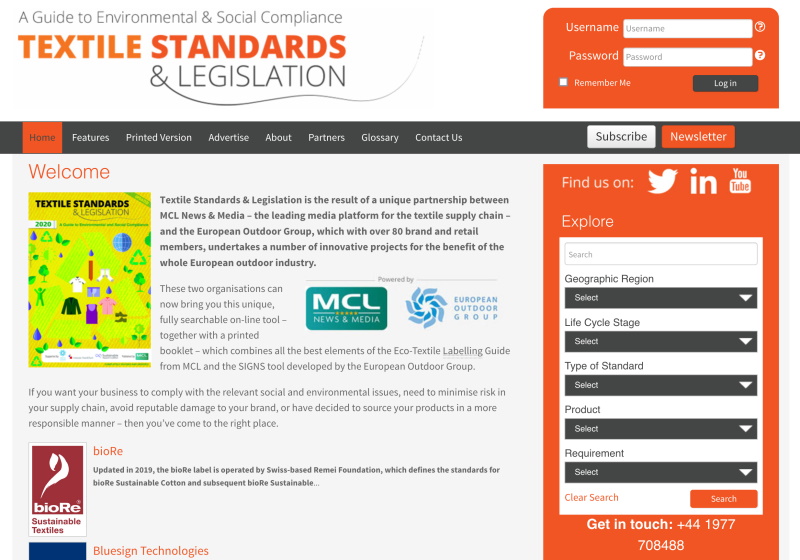MCL News & Media has updated its textilestandards.com website with the addition of 10 further standards that cover environmental and social issues in the textile industry. Previously included industry tools and standards have also been updated to the reflect the most recent criteria.
Newly-included standards include the Good Cashmere Standard, Regenerative Organic Certified, Responsible Alpaca Standard and the International Accord for Health and Safety - which replaces the previous Bangladesh Accord - that have been added to the long list of 80+ textile industry standards.
The Textile Standards & Legislation website is designed to give readers a snapshot of the most relevant voluntary and obligatory environmental standards, tools and labels in our industry and to update readers on recent changes to label criteria which often go unnoticed.
Amongst these new additions is The Good Cashmere Standard, that’s been launched by the Aid by Trade Foundation, which also controls the Cotton Made in Africa standard that claims to serve as a ‘benchmark’ for sustainably produced cashmere that minimises the impact on animal welfare and the environment where the fibre is farmed in Inner Mongolia. It offers what it says is a ‘unique marking system’ that ‘ensures greater transparency and traceability’ throughout the textile chain in partnership with Tailorlux GmbH.
Meanwhile, we’ve also added details on the International Accord for Health and Safety, which was launched in September 2021. Intended to replace the legally-binding agreement behind the now defunct Bangladesh Accord on Fire and Building Safety it also focuses on garment worker safety but aims to also extend its remit to other countries around the world.
Recently added or updated tools and standards include:
- The Good Cashmere Standard
- International Accord for Health and Safety
- Responsible Alpaca Standard
- ISO: IWA 32:2019
- Regenerative Organic Certified
- Fair Trade
- ZQ Merino
- The Nativa Label
- PEFC
- Canopy: Hot Button Ranking
From 1st September the new International Accord includes a 26-month legally binding agreement by brands and retailers to ensure that ready-made garment (RMG) factories are safe, according to the guidelines that can be found on the Textile Standards website.
At its launch UNI general secretary, Christy Hoffman, said: “In signing the International Accord, brands and retailers shore up their commitment to factory safety in Bangladesh and agree to establish badly-needed enforceable and transparent health and safety programmes in at least one other garment producing country.”
Other new standards added to the online database include the PEFC (The Programme for the Endorsement of Forest Certification) which aims to make sure that forests are managed in line with international environmental requirements, safeguarding them and protecting their diversity in over 330 million hectares of PEFC-certified forest.
The relatively new Nativa Label focuses on traceability and transparency in the merino sheep industry and animal welfare overall. The Chargeurs Group owned standard uses blockchain technology and generates a unique QR code for products – however there are as yet no third-parties yet accredited to certify this particular standard.
To see these standards, visit the Textile Standards & Legislation website at www.textilestandards.com. You can SUBSCRIBE HERE. The eighth edition of the printed version of this 100+ page guidebook will be available in 2022.


